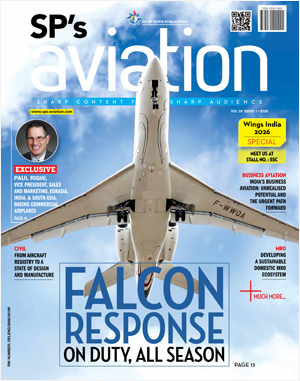INDIAN ARMED FORCES CHIEFS ON OUR RELENTLESS AND FOCUSED PUBLISHING EFFORTS

The insightful articles, inspiring narrations and analytical perspectives presented by the Editorial Team, establish an alluring connect with the reader. My compliments and best wishes to SP Guide Publications.

"Over the past 60 years, the growth of SP Guide Publications has mirrored the rising stature of Indian Navy. Its well-researched and informative magazines on Defence and Aerospace sector have served to shape an educated opinion of our military personnel, policy makers and the public alike. I wish SP's Publication team continued success, fair winds and following seas in all future endeavour!"

Since, its inception in 1964, SP Guide Publications has consistently demonstrated commitment to high-quality journalism in the aerospace and defence sectors, earning a well-deserved reputation as Asia's largest media house in this domain. I wish SP Guide Publications continued success in its pursuit of excellence.
- A leap in Indian aviation: Prime Minister Modi inaugurates Safran's Global MRO Hub in Hyderabad, Calls It a Milestone
- All about HAMMER Smart Precision Guided Weapon in India — “BEL-Safran Collaboration”
- India, Germany deepen defence ties as High Defence Committee charts ambitious plan
- True strategic autonomy will come only when our code is as indigenous as our hardware: Rajnath Singh
- EXCLUSIVE: Manish Kumar Jha speaks with Air Marshal Ashutosh Dixit, Chief of Integrated Defence Staff (CISC) at Headquarters, Integrated Defence Staff (IDS)
- Experts Speak: G20 Summit: A Sign of Global Fracture
Struggle Goes On

Unless the government progresses beyond rhetoric and takes radical steps with speed and sincerity to address the problems, it is only a matter of time before other carriers may go the Kingfisher way
The airline industry in India appears to be going through challenging times. Passenger traffic has been falling since May this year when it came down to 54.48 lakh as against 54.96 lakh in May 2011. In the following month, there was a reduction by 3.84 per cent, dropping from 53.12 lakh in June 2011 to 51.08 lakh in June this year. It reduced further in September this year when it stood at 40.18 lakh down from 43.69 lakh in the previous month. The forecast for the coming winter is not too optimistic either.
Capital-intensive and fragile, the airline industry in India is engaged in a desperate struggle for survival as it continues to battle an array of hostile factors which an insensitive government is loathe to address. Amongst the factors that seriously threaten the well-being of the airline industry, the most critical is the cost of aviation turbine fuel (ATF) which constitutes nearly 50 per cent of an airline’s operating expenses. Taxes are levied both by the central and state governments; but despite being aware of the problem, neither is willing to relent and remove or even reduce some of the levies. Price of ATF is deregulated and is linked directly to the international price of crude which has maintained a rising trend aggravating the plight of the industry. However, quite surprisingly, there is never any mention of the imperative need to enhance the efficiency of the oil marketing companies (OMC) that are largely government-owned and like all other similar establishments, could do with some introspection instead of conveniently passing on the cost of inefficiency to the hapless customer. A comparative study of the pricing of ATF in the neighbourhood i.e. the Middle East and South East Asia would clearly indicate the scope of reduction by the OMC of the end product against the prevailing international price of crude.
The proposal to allow Indian carriers to directly import ATF for their own use, on the face of it is an attractive one as it would result in savings by way of sales tax of 22 to 26 per cent as well as import duty of 8.5 to 10 per cent that airlines are required to shell out. However, as the OMCs have total control over the infrastructure, private carriers would have to create parallel facilities entailing massive investments which would not be costeffective and would only impose additional financial burden.
Then there is the issue of inordinately high airport charges. In the recent past, there has been a 345 per cent increase in airport charges at the Indira Gandhi International Airport (IGIA) at Delhi. Although it was a matter of relief for the industry that the Airports Economic Regulatory Authority rejected the proposal by the Delhi International Airport Limited for the enhancement of airport charges by 780 per cent, even the 345 per cent increase by any standard is exorbitant. The Mumbai International Airport Limited has in turn proposed an increase of airport charges by 660 per cent. Not only would such unreasonable increase in charges be detrimental to the finances of the domestic carriers, the metro airports, especially those at Delhi and Mumbai, would lose out on the opportunity of emerging as regional hubs as foreign carriers are reworking their strategies for operating into India as they find Indian metro airports much too expensive. Compare Delhi and Mumbai airports with Dubai, a major regional hub, that levies no tax on fuel, there is no airport development fee or user development fee.





